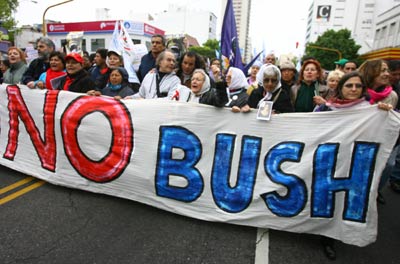|
Summit protests turn violent in Argentina
(AP)
Updated: 2005-11-05 07:49
More than 1,000 demonstrators angry about President Bush's policies clashed
with police, shattered storefronts and torched businesses Friday, marring the
inauguration of the Summit of the Americas as leaders began debating creation of
one of the world's largest free trade zones.

People protest over the presence of U.S.
President George W. Bush at the 4th Summit of the Americas during a march
through the center of Mar del Plata, Argentina, November 4, 2005.
[Reuters] |
The violence reflected the often violent, worldwide debate on free trade as
the United States and Mexico pushed to relaunch talks on creating a free trade
area stretching from Canada to Chile. Past summits on free trade — including
last year's summit of Asian-Pacific leaders in Chile — have drawn bitter
opposition and similar angry protests.
Venezuelan President Hugo Chavez emerged as the most strident opponent of the
plan, addressing more than 10,000 protesters hours before the summit convened in
this normally tranquil seaside resort.
Chavez vowed to defeat the Free Trade Area of the Americas, or FTAA, once and
for all. Speaking before a six-story banner of revolutionary Che Guevara, Chavez
urged the throng — including soccer great Diego Maradona and Bolivian
presidential hopeful Evo Morales — to help him fight free trade.
"Only united can we defeat imperialism and bring our people a better life,"
he said, adding: "Here, in Mar del Plata, FTAA will be buried!"
Before Chavez's speech, demonstrators flooded the streets, shouting "Get out
Bush!" and "Fascist Bush! You are the terrorist!"
Mexican President Vicente Fox said the FTAA proposal would move forward
anyway because 29 of the 34 nations taking part in the summit were considering
cobbling together their own FTAA — without opponents Venezuela, Brazil,
Argentina, Paraguay and Uruguay.
As leaders inaugurated the two-day summit to work out their differences on
free trade, a smaller group of protesters threatened a barricade of riot police,
prompting authorities to fire tear gas into the crowd.
The protesters, armed with large wooden clubs, began smashing storefront
windows and setting at least one bank on fire just outside the gated summit
security zone. One restaurant with anti-Bush posters plastered across its
windows was untouched.
Car sirens wailed and residents — including elderly people and children —
fled as protesters launched rocks with slingshots and threw sharpened sticks at
police. They also set fire to U.S. flags, using them as fuel for bonfires.
More than 50 people were detained, police said. It was unclear if there were
injuries.
Ramon Madrid, a hotel manager, hurriedly closed up.
"I don't like Bush, but this is too much. There is no need for violence,"
Madrid said.
Top-level negotiators at the summit have so far failed to agree on key
language aimed at relaunching talks as soon as April for the proposed FTAA — an
ambitious proposal originally raised in 1994 at the first Americas summit in
Miami.
The trade zone would rival the European Union as the world's largest, but its
creation has been stalled for years amid bickering over U.S. farm subsidies and
other obstacles.
Chavez and protesters argue that free trade is being forced on Latin American
countries. He has instead pushed for an anti-FTAA deal based on socialist
ideals. He has used Venezuela's oil wealth to push for regional solidarity,
offering fuel with preferential financing to various Caribbean and Latin
American countries.
Venezuela is a member of the Organization of Petroleum Exporting Countries
and is the world's fifth largest oil exporter as well as a major supplier to the
U.S. market.
Chavez also regularly claims the United States is trying to overthrow his
government, something the U.S. denies.
Joking about his rivalry with Bush, the Venezuelan president has said he
might try to sneak up and scare the U.S. president during the summit.
When asked how he would react to a close encounter with Chavez, Bush said he
would be polite.
"That's what the American people expect their president to do, is to be a
polite person," he said. "And if I run across him, I will do just that."
After meeting with Argentine President Nestor Kirchner, Bush made no mention
of free trade but said the two had a frank talk about Argentina's struggle to
extricate itself from its financial meltdown.
Kirchner led a difficult renegotiation of more than $100 billion in public
debt that was the largest sovereign default in history.
"The president was quite frank," Bush said.
Some 40 percent of Argentina's 36 million people remain in poverty, and many
blame trade liberalization for destroying local industries and causing a flood
of cheap imports.
|